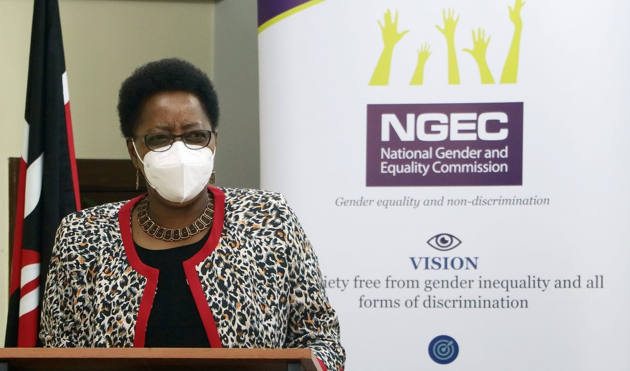STATEMENT ON OBSERVANCE OF THE INTERNATIONAL DAY OF ZERO TOLERANCE FOR FGM
The National Gender and Equality Commission joins Kenya and the rest of the world in commemorating the International Day of Zero Tolerance for Female Genital Mutilation. This day is marked on the 6th of February of each year to amplify and direct the efforts on the elimination of Female Genital Mutilation (FGM). States often mark this day through public education programs on among others negative consequences of FGM and displaying practices and innovations that have worked well. States also celebrate achievements and renew their commitments to mobilize political will and resources to eradicate FGM.
The theme for the year 2023 is ‘Partnering with men and boys to transform social and gender norms to End Female Genital Mutilation’. The theme is a call to mobilize partnerships with men and boys and to create new positive gender norms.
Female genital mutilation (FGM) is a human rights violation and has negative effects on the physical, social, and emotional well-being of women and girls. It violates a series of well-established human rights principles, norms, and standards, including the principles of equality and non-discrimination, the right to life (when the procedure results in death), the right to freedom from torture and cruel, inhuman, or degrading treatment or punishment, and the freedoms of the child from harm. FGM is a manifestation of gender inequality deeply entrenched in social, political and economic structures. In many cultures, FGM is considered a rite of passage and is deeply entrenched in cultural traditions and religious beliefs. In some communities, FGM is seen as providing group identity, prestige, community acceptance, marriageability, and inclusion.
In Kenya, the prevalence of FGM steadily declined over the last two decades. According to the Kenya Demographic and Health Survey (KDHS), 2022, the prevalence among women aged 15-49 declined from 38 percent in the year 1998, 32% in the year 2003, 21% in the year 2014 and further down to 15 percent in 2022. The declining trend is a result of massive investment in programmatic, policy, and legal measures towards the elimination of this practice. However, there are major regional and county differentials with some counties and regions recording five or more times higher prevalence than the national average. Further, Kenya has set a target of eliminating FGM practices before the year 2030 meaning accelerated efforts are required to achieve this modest target. Additional information shows that FGM practice is changing in terms of the age profile of girls and women exposed, as well as those executing the vice, the manner when and when the practices take place. There are selected incidences for example where the demand for FGM is promoted by young men and community gatekeepers, while in other cases medical practitioners are known to conduct the practice. Some case studies point to some consensus that men and boys have not been effectively engaged in anti-FGM campaigns. These emerging trends must be dealt with.
During this year's commemorations, the National Gender and Equality Commission (NGEC) calls on State and non-State actors running anti-FGM programs to purposefully involve boys and men as champions and influencers in eliminating FGM. Programs must build capacities of boys and men to positively shift social and gender norms towards greater protection of the rights of women and girls. Boys and men need to be empowered to challenge the negative patriarchal beliefs and practices that drive social inequality at individual, interpersonal, community, institutional, and structural levels. In addition, Kenya needs to almost double its financial investment in anti-FGM programming if we are to eliminate the practice by 2030.
NGEC, affirms its commitment to supporting all efforts on zero tolerance for FGM. The Commission shall continue to monitor progress made in eliminating FGM, monitor levels of compliance with international and regional commitments on protecting rights of the vulnerable groups including women and young girls, and promote access to justice for victims of FGM.
SIGNED
Dr. Joyce M. Mutinda PhD, EBS
Chairperson


Comments